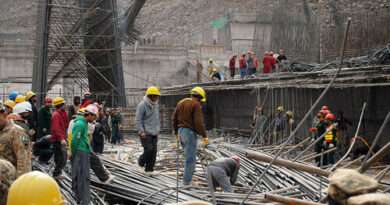Zardari’s China Visit: A Game Changer for Pakistan’s Future?
|
Getting your Trinity Audio player ready...
|
Strategic Alliances, Economic Recovery, and Security Cooperation Take Center Stage
Introduction
President Asif Ali Zardari’s visit to China at the invitation of President Xi Jinping marks a crucial milestone in Pakistan-China relations. This visit holds significant importance as Pakistan grapples with economic instability, security concerns, and climate change challenges.
Amid these pressing concerns, strengthening bilateral ties with China has become imperative for Pakistan. The visit focused on reinforcing economic partnerships, ensuring security cooperation, and advancing connectivity projects such as the China-Pakistan Economic Corridor (CPEC). While China has reassured its support, Pakistan must undertake substantial reforms to fully capitalize on the opportunities offered.
Economic Revival Through Strategic Partnerships
The Need for Economic Transformation
Pakistan’s economic situation has been dire, with a stagnant GDP growth rate, financial mismanagement, and inadequate investment opportunities. The country needs robust reforms to attract foreign investment, reduce reliance on external loans, and strengthen its trade partnerships. President Zardari’s discussions with Chinese leaders revolved around economic revitalization, investment opportunities, and trade expansion.
China’s Support for Pakistan’s Economy
China has always been a reliable partner in Pakistan’s economic development. During the visit, President Xi Jinping reaffirmed China’s commitment to aiding Pakistan in overcoming its financial crises. Agreements were made to enhance trade ties, facilitate Chinese investment, and accelerate infrastructure projects under CPEC.
Reforming Pakistan’s Business and Investment Climate
Pakistan must reform its business and investment environment to attract and sustain foreign investments. The following steps are crucial:
- Eliminate Bureaucratic Delays: Streamlining approval processes for businesses to reduce delays and inefficiencies.
- Curb Corruption: Implementing transparent policies to encourage fair competition.
- Enhance Special Investment Facilitation Council (SIFC): Employing professionals with expertise in Chinese trade and investment to optimize decision-making.
- Improve Living Conditions: Investors consider factors such as education, healthcare, and recreation before committing to investments.
Security Challenges and Counter-Terrorism Cooperation
Growing Security Concerns
The resurgence of terrorism in Pakistan, particularly after the withdrawal of U.S. forces from Afghanistan, has raised serious concerns. Terrorist organizations have increasingly targeted Chinese nationals and CPEC projects, disrupting economic progress and foreign investments.
China-Pakistan Security Collaboration
Security cooperation was a major agenda item during Zardari’s visit. China and Pakistan agreed to:
- Strengthen Intelligence Sharing: Enhancing counter-terrorism efforts to prevent attacks on CPEC and Chinese personnel.
- Improve Security Protocols: Implementing stricter measures to ensure the safety of foreign investors and workforce.
- Deploy Joint Security Forces: Ensuring the protection of critical infrastructure and economic corridors.
A stable security environment is essential to facilitate economic growth and attract further Chinese investments in Pakistan.
Leveraging CPEC for Economic Growth
Current Challenges in CPEC Implementation
Despite being a flagship project, CPEC has encountered multiple roadblocks:
- Delays in Special Economic Zones (SEZs): Many SEZs are not fully operational despite being launched over a decade ago.
- Limited Agricultural Cooperation: Pakistan has yet to maximize its agricultural exports to China.
- Lack of Industrial Growth: Manufacturing and industrial sectors have not progressed as expected under CPEC.
Optimizing CPEC Benefits
To fully utilize CPEC’s potential, Pakistan must:
- Accelerate SEZ Development: Ensuring operational readiness of economic zones.
- Expand Agricultural Exports: Leveraging China’s rising demand for agricultural and food products.
- Enhance Infrastructure and Logistics: Improving road and rail connectivity to facilitate smoother trade routes.
Boosting Pakistan’s Exports to China
Opportunities in the Chinese Market
China has offered Pakistan multiple avenues to enhance exports, particularly in agriculture, food, and dairy products. A free trade agreement exists between the two countries, but Pakistan has yet to fully utilize it.
High-Potential Export Sectors
Pakistan can benefit from exporting:
- Meat and Dairy Products: High-quality Pakistani meat and dairy have a significant market in China.
- Fresh Fruits and Vegetables: Pakistani mangoes, citrus fruits, and vegetables are in demand.
- Processed Foods and Grains: Expanding rice exports and processed food products can yield high revenue.
However, government negligence, low priority, and failure to meet international quality standards hinder Pakistan’s export potential.
Understanding China’s Economic and Governance Model
Bridging the Knowledge Gap
A major issue slowing down cooperation is the lack of understanding of China’s economic, trade, and governance models. Many Pakistani officials and policymakers approach China with a Western economic perspective, leading to misinterpretations and delays in implementing agreements.
Developing Expertise in Chinese Affairs
To enhance collaboration, Pakistan should:
- Recruit China-Trained Professionals: Employ individuals who have studied and worked in China.
- Establish a China Studies Research Center: Promoting research and understanding of Chinese governance, trade, and investment policies.
- Facilitate Cultural and Educational Exchange: Encouraging knowledge transfer between institutions.
Conclusion: Moving Beyond Rhetoric to Practical Implementation
Pakistan’s future economic growth and security depend on strategic partnerships, particularly with China. President Zardari’s visit laid the groundwork for cooperation in trade, security, and investment. However, Pakistan must prioritize action over rhetoric to truly benefit from these opportunities.
To achieve lasting progress, Pakistan must:
- Transform its investment climate to attract Chinese businesses.
- Ensure robust security measures to protect CPEC and foreign investments.
- Expand its export sector to take advantage of China’s massive market.
- Enhance expertise in China’s economic model for smoother collaboration.
Without concrete reforms, the benefits of this strategic visit will remain unfulfilled. The time to act is now.
Frequently Asked Questions (FAQs)
1. Why is Zardari’s visit to China important for Pakistan? President Zardari’s visit focuses on strengthening economic ties, enhancing security cooperation, and advancing CPEC projects, all of which are crucial for Pakistan’s economic revival.
2. How does China benefit from investing in Pakistan? China views Pakistan as a key strategic partner in its Belt and Road Initiative (BRI), with CPEC serving as a critical trade and connectivity corridor.
3. What challenges does Pakistan face in utilizing CPEC fully? Delays in infrastructure projects, security concerns, and bureaucratic inefficiencies hinder the full potential of CPEC.
4. What steps should Pakistan take to boost exports to China? Pakistan should focus on meeting international quality standards, enhancing agricultural exports, and leveraging trade agreements to increase exports to China.
5. How can Pakistan improve its investment environment? By reducing corruption, streamlining approval processes, improving security, and enhancing living conditions for investors.




